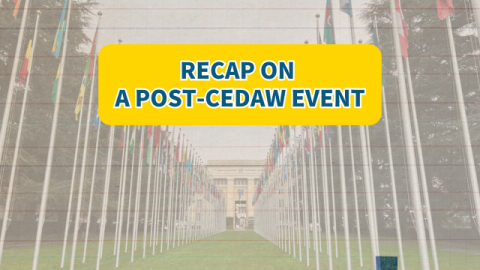Recap on a Post-CEDAW Event
January 31, 2025

On 25 January, the Forum of Minority Women* organised an event in Osaka to reflect on and share insights from the recent review of the 9th periodic report of Japan by the Committee on the Elimination of Discrimination against Women (CEDAW). A total of 120 people participated, both in person and online.
◾︎ CEDAW and Women from Marginalised Communities in Japan ◾︎
Firstly, how women from marginalised communities have made their presence and situation visible through their involvement in CEDAW was shared.
In 1985, Japan ratified Convention on the Elimination of All Forms of Discrimination Against Women.
In 2003 (the consideration of the fourth and fifth periodic reports), for the first time, ‘minority women’ were mentioned, and recommended to provide disaggregated data on the situation of minority women in Japan in the next periodic report.
In 2007, Buraku, Ainu Indigenous and Zainichi Korean women conducted surveys on their actual status by themselves (2004-2005), and published their findings in the book.
In 2009 (the consideration of the sixth periodic report), recommendations were made to create a policy framework and take special measures to address discrimination against women from marginalised communities.
In 2010, the Japanese government started to cover minority women in its 3rd Basic Plan on Gender Equality.
In 2016 (the consideration of the seventh and eighth periodic reports), recommendations were made to enact a law that comprehensively prohibits multiple forms of discrimination against minority women and to develop a legal framework to sanction hate speech.
In 2024 (the consideration of the ninth periodic report), recommendations were made to incorporate a comprehensive definition of discrimination against women … covering intersecting forms of discrimination into domestic legislation. The incorporation of a definition of discrimination against women in the law has been recommended from the outset, yet for the first time, it also covers ‘intersectional forms of discrimination’.
◾︎ Key Takeaways from the Review ◾︎
A panel of representatives from the Central Women Division of Buraku Liberation League (BLL), the Ainu Women Association – Menoko, mosi-mosi, APRO Zainichi Korean Women Network, and Be the Change Okinawa, presented key points from the 89th CEDAW session.
A Buraku woman emphasised that relentless outings of Buraku individuals and their neighbourhoods on the Internet infringe on their right to live in safety. In the review process, Buraku women called for: enacting a comprehensive anti-discrimination law covering multiple forms of discrimination; establishing a National Human Rights Institution; amending the present acts to deal with discrimination issues including “Act on the Promotion of the Elimination of Buraku Discrimination” (2016) to cover multiple forms of discrimination; adopting the individual communication system; surveying the actual status of women from marginalised communities; promoting minority women’s participation in the decision-making process at the national level.
An Ainu Indigenous woman emphasised that discrimination against Ainu women has been made visible through participation in the CEDAW review. In recent years, Ainu women have been targeted for online hate speech. A prominent case is the hate speech repeatedly made by the public figure despite the instruction given by the government’s human rights bureau. Immediate establishment of a National Human Rights Institution was called for.
A Zainichi Korean woman highlighted that discrimination is accumulative and it eventually discourages Zainichi Korean women from publicly revealing their identities out of fear. They called for conducting an official survey to find the status of Zainichi Korean women for the purpose of eliminating discrimination against them, and for creating a national mechanism to prevent, act on and remedy for aggression against them including hate speech, hate crimes and online defamation.
A Ryukyu woman noted that CEDAW made recommendations on gender-based violence against women repeatedly committed by United States military personnel on its Okinawa military bases by calling for actions to ensure meaningful and inclusive participation of women in all stages of peacebuilding processes, and to prevent, investigate, prosecute and adequately punish perpetrators as well as to provide adequate compensations.
◾︎ Talk Session ◾︎
During the talk session among 4 representatives and the moderator, the following was discussed among others.
◉ How will the recommendations be used?
- Inform the other members of the organisation of the recommendations.
- Disseminate the recommendations at the local level
- Raise awareness of men in the same community
- Monitor gender equality plan to ensure it aligns with recommendations
- Conduct public awareness raisings on the recommendations, including through study sessions.
◉ Messages to the future generations
“Let us keep raising our voices. Only when issues faced by people from minority communities are improved, will the social structure of Japan change.”
“It is crucial that everyone knows and talks about human rights and discrimination in a setting where everyone feels safe and secure.”
“Intersecting/multiple forms of discrimination is a product of unequal social structure, so society, as a whole, needs to understand what it is.”
“History of women from marginalised communities and the discrimination they face should be understood by all.”
▶︎ Joint NGO report can be found here
▶︎ Concluding observations on the ninth periodic report of Japan can be found here
*Forum on Minority Women consists of the Ainu Women Association – Menoko, mosi-mosi, APRO Zainichi Korean Women Network, Central Women Division of Buraku Liberation League (BLL) and International MovementAgainst All Forms of Discrimination and Racism (IMADR) work for the elimination of multiple forms of discrimination faced by women of minority and indigenous communities in Japan. Since 2003 (at the 29th session), we have continually participated in the review of Japan by the CEDAW.



